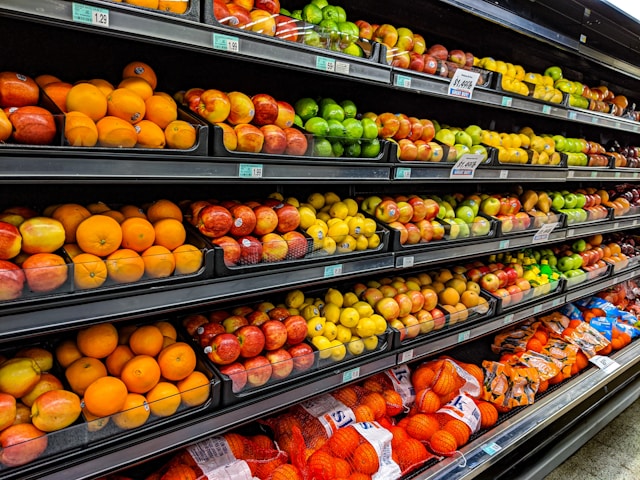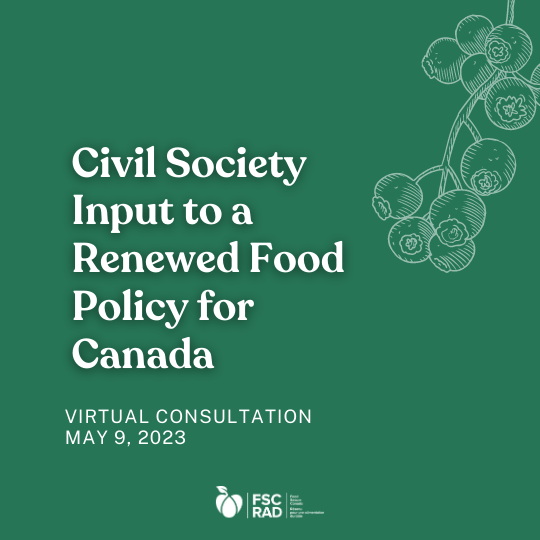by Marissa Alexander and Wade Thorhaug
“We are a free, sovereign, and ambitious nation.”
So said Prime Minister Mark Carney on Monday night in his acceptance speech, underlining the need for strength against Donald Trump’s bullying. But as his government prepares to respond to these challenges, much of the problem will be, precisely, that we are not free or sovereign. This fact couldn’t be more clear when it comes to Canada’s food system.
The Buy Canadian movement shows that Canadians badly want to choose Canada, with 63% of Canadians actively seeking Canadian products when shopping. However, there’s just one snag: not enough locally-grown food is destined for Canadians. Not only is over half our food imported, half of it is exported, too. That means there’s just not enough Canadian goods in the supermarket aisles to make a dent in the trade war.
This import-export model, with long supply chains and dependency on foreign trade relationships, not only weakens us against the United States, it also leaves us vulnerable to global disruptions, as we saw during the pandemic. Without a resilient local food system, Canada will never be sovereign. Supporting local farmers with much-needed infrastructure is a key way to improve Canada’s economic security, and therefore its position at the bargaining table.
Speaking of tables, another place that Canadians lack sovereignty is at the dinner table. In 2023, one in four Canadian households experienced food insecurity—a number that is almost double for Indigenous and Black households. This is a national emergency. Having employment no longer means you can feed your family: 60% of food insecure households have a steady job. How can people choose to buy Canadian, when so many can’t afford to buy food at all?
Research shows that guaranteeing a minimum income floor—whether it is through senior, child, or disability benefits, or a minimum income—is the best way to cut down on food insecurity. The Liberal policy platform only promises to marginally increase benefits. For Canada to meet the Sustainable Development Goal of eradicating severe food insecurity by 2030, it will need to do a lot more to support those who can’t work, and those who work hard, but whose pay is too little. This is especially the case as we are likely heading into a recession.
Another area where Canadians lack food sovereignty is in the food retail landscape. Just five companies control over 80% of Canada’s food retail market, and two of them are from the United States. On that front, even the United States ranks much better, with roughly 20 retailers controlling 80% of its market. This lack of choice increases the power of retailers to raise prices whenever they want, and forces our farmers to sell cheap, creating a food system where corporate profits are made to the detriment of both farmers and Canadians.
It should be no surprise that price gouging and lack of competition was one of the top news items of the last year. It got so bad that, just before Donald Trump was re-elected in November, one poll found that grocery costs were Canadian’s number one economic concern, above housing. However, there was no mention of strengthening competition in food retail in the Liberal’s policy platform. Now that they are elected, they could show a bit more ambition here. We need strong policies that break up the food retail oligopoly and support independent grocers, small businesses, farmers, and suppliers. Not only is this necessary to build Canada’s economic sovereignty, it would be immensely popular.
There is one place where Canada has a degree of sovereignty: its supply management system, supporting dairy, eggs, and poultry farmers. Developed to guarantee predictable incomes for farmers, supply management has protected them from being undercut by highly subsidised US producers.
Trump really doesn’t like that system. Even though Canada’s dairy market is miniscule compared to the US dairy market, he has repeatedly brought up Canada’s dairy supply management and wants to end it in the next trade negotiations. But it would be a very bad idea to give up on one of our most valuable chips at the bargaining table. The Liberals have acknowledged as much, promising to “keep Canada’s supply management off the table in any negotiations with the U.S.” They would do well to also strengthen, and expand, this system to other sectors, such as legumes and grains. This would provide Canada more economic sovereignty, giving it leverage to resist aggressive tariffs.
This election, Canadians wanted to see policies that address corporate price gouging, food insecurity, and lack of local food in the supermarket. Trump’s tariffs show us that we need to be more economically self-reliant. If we really want to be free and sovereign, we will need an ambitious vision by the new Liberal government to meet these challenges. Food sovereignty is an obvious, and popular, place to begin.



